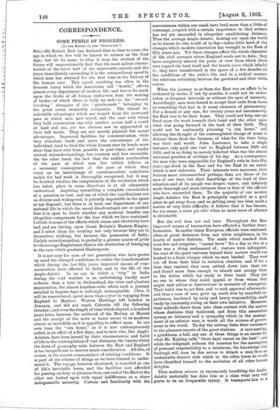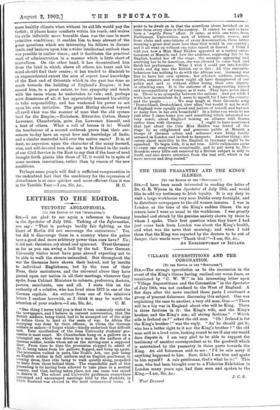CORRESPONDENCE.
SOME PERILS OF PROGRESS.
[To THE EDITOR OP THE " SPECTATOR:1
SIE,—Sir Robert Ball has declared that in time to come the age in which we live will be known to science as the Coal
Age; but let its name be what it may, the student of the future will unquestionably find that the most salient charac- teristic of the latter half of the nineteenth century and the years immediately succeeding it is the extraordinary speed to which man has attained for the first time in the history of the human race. This speed, resulting too often in the feverish hurry which the Americans call "hustle," affects almost every department of modern life, and leaves its mark upon . the fruits of all human endeavour, from the making of books—of which there is truly no end—to the " record- breaking " struggles of the "greyhounds" belonging to the great ocean steamship companies. The almost in- calculable advantages which are reaped from the increased pace at which men now travel, and the ease with which they hold communion one with another across half a world of land and sea, are too obvious not be appreciated at their full worth. They are not merely physical but moral advantages. Improved facilities for communication, while they stimulate trade and serve the convenience of the individual, tend to bind the whole human race by bonds more close than have ever been possible in past times, and render mutual misunderstandings less common and less excusable. On the other hand, the fact that the sudden acceleration of the pace at which men live (which follows as a necessary consequence of the pace at which they carry on an interchange of communication) sometimes makes for bad work is thoroughly recognised, but it may be doubted whether the completeness of the revolution which has taken place in some directions is at all adequately understood. Anything resembling a complete examination of a question so vast, and one of which the ramifications are so diverse and widespread, is patently impossible in the space at my disposal; but there is at least one department of our national life in which the moral disadvantages are so marked that it is open to doubt whether any material benefits can altogether compensate for the loss which we have sustained. I allude to some of the effects which steam and electricity have had, and are having, upon Great Britain's Eastern Empire, and I select them for scrutiny not only because they are in themselves striking, but because the possession of India, Carlyle notwithstanding, is probably a greater source of pride to the average Englishman than is the distinction of belonging to the race which produced Shakespeare.
It is not easy for men of our generation, who have grown up amid the changed conditions, to realise the transformation which during the last fifty years improved means of com- munication have effected in India and in the life of the Anglo-Asiatic. In an age in which a " trip " to India during the cold weather is an undertaking hardly more arduous than • a tour in Switzerland, the utter and absolute expatriation, the almost hopeless exile, which such a journey entailed in bygone days is well-nigh unimaginable. Clive, it will be remembered, spent more than a year in voyaging from
• England to Madras; Warren Hastings left London in January, and did not reach Calcutta till the following October; and even the length of time which elapsed, a hundred years later, between the outbreak of the Mutiny at Meerut and the receipt of the news at home seems to us moderns almost as incredible as it is appalling to reflect upon. In our own time the "run home," as it is now contemptuously called, is an affair of a few days; and to men who, like Anglo- Asiatics, have been inured by their circumstances and habit of life to the contemplation of vast distances, the barrier which the facts of geography raise between the East and England is too insignificant to deserve much consideration. All this, of course, is the merest commonplace of existing conditions. It is part of the scheme of things as we have learned to under- stand it. The voyage, however shortened, is regarded as one of life's inevitable bores, and the facilities now afforded for passing on duty or pleasure from one end of the East to the other are looked upon with equal indifference as a sheer indispensable necessity. Custom and familiarity with the
conveniences within our reach have bred more than a little of contempt, coupled with a certain impatience in that science has not yet succeeded in altogether annihilating distance. Thus the average Anglo-Asiatic, looking out upon the world as he knows it—the world of to-day—takes little heed of the changes which modern innovation has wrought in the East of fifty years ago. Yet these changes affect the whole character of the civil servants whom England sends out to Asia; they have completely altered the point of view from which these men regard the land itself and the brown races which inhabit it; they have transformed in the space of a few decades all the conditions of the exile's life, and in a radical manner the relations subsisting between the governed and their white rulers.
When the journey to or from the East was an affair to be reckoned by weeks, if not by months, it could not be under. taken at frequent intervals or without the spur of necessity. Accordingly, men were forced to accept their exile from home as something that had in it many elements, of permanency. For a decade at any rate, for twenty years not uncommonly, the East was to be their home. They could not keep one eye fixed upon the work beneath their hand and the other upon what was going forward in the land of their birth. They could not be continually planning "a run home," and allowing the thought of the contemplated change of scene to distract them from the business of what for the time being was their real world. John Lawrence, to take a single instance, only paid one visit to England between 1829 and 1859, and in so doing he merely followed what was the almost universal practice of civilians of his day. As a consequence, the men who were responsible for England's rule in Asia fifty years ago lived in the East and for the East to an extent which is now unknown. Their interests were narrower, their horizon more circumscribed perhaps, than are those of the men of our time, but their knowledge of the land of their adoption and of its people was deeper, vaster, and infinitely more thorough and more intimate than is that of the officials who have succeeded them. To the majority of our modern Anglo-Asiatics the East it; principally regarded as a good place to get away from, and as getting away has been made a matter of very little difficulty, it follows that it has become, for too many, a mere pis aller when no more leave of absence is obtainable.
But the evil does not end here. Throughout the East improved means of locomotion have effected a further trans. formation. In earlier times European officials were stationed, often at great distances from any white neighbours, in the hearts of native districts. The mails which reached them were few and irregular; "casual. leave" for a day or two at a time was a thing undreamed of; visitors were infrequent; the roar of the great universe beyond their narrow world was hushed to a faint whisper which no man heeded. They were cut off from their kind in isolation absolute, and if for a time they repined, they soon settled down into their rut, and found more than enough to absorb and occupy them in the duties which lay ready to their hand. They had no one to whom they could appeal, or from whom they might seek advice or instructions in moments of emergency. Their habit was to act first, and to seek approval afterwards; and thus a race of men grew up made wise by manifold es. periences, hardened by early and heavy responsibility, made ready by constantly acting on their own initiative. Moreover, their solitude threw them into close contact with the natives whose destinies they fashioned, and from this association sprang an intimacy and a sympathy which, in the manage- ment of an inferior race, is worth all the science of govern- ment in the world. To-day the railway links their successors to the pleasure-resorts of the great stations. A race meeting, a gymkhana, a ball, any one of these things is an excuse for what Mr. Kipling calls "three days' casual on the bust"; and while the telegraph reduces the occasion for the assumption of personal responsibility to a minimum, the knowledge that furlough will soon be due serves to detach a man from an undesirable district with which in the olden times he would have identified himself to the exclusion of all other human delights.
Thus modern science in enormously benefiting the Anglo.
Asiatic materially has done him as a class what may well prove to be an irreparable injury. It transports him to a
more healthy climate when without its aid life would• pay the fiirfeit ; it places -home comforts within his reach, -and makes his exile infinitely more bearable than was the case in more primitive conditions; it enables him to keep .abreast of the great questions which are interesting his fellows in distant lands, and bestows -upon him a wider intellectual outlook than Was possible in earlier times ; and it facilitates the practical work of administration in a manner which is little short of marvellous. On the other hand, it has decentralised him from the land in which, above all others, his heart and his mind should find their centre ; it has tended to diminish to an unprecedented extent the sum of expert local knowledge of the East and of Orientals which in the past has done so much towards the building of England's Empire; it has caused him, to a great extent, to lose sympathy and touch with the races whom he undertakes to rule; and, perhaps most disastrous of all, it has appreciably lessened his ability to take responsibility, and has weakened his power to act upon his own initiative. The great Mutiny showed beyond all cavil what was the manner of man that the old system bred for the Empire,—Nicholson, Edwardes, Cotton, Henry Lawrence, Chamberlain, grim Jan Lawrence himself, and a host of others. What a roll of heroes it is! Would the touchstone of a second outbreak prove that their suc- cessors to-day have an equal love and knowledge of India, and a similar masterful hold over the native races ? It is, at least, no aspersion upon the character of the many learned, wise, and sell-devoted men who are to be found in the ranks of our Civil Service in the East to say that if the hour of need brought forth giants like those of '57, it would be in spite of some moaern innovations, rather than by reason of the new conditions.
Perhaps some people will find a sufficient compensation in the undoubted fact that the machinery for the repression of disturbance is at once quicker and more efficient than it was in the Terrible Year.—I am, Sir, &c., H. C.







































 Previous page
Previous page